Dystopian Fiction: What to Read after The Hunger Games
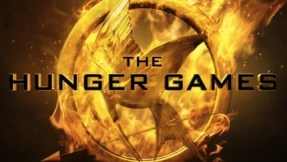
The Hunger Games, a trilogy of novels written by Suzanne Collins, has recently exploded in popularity in a similar style to Harry Potter and Twilight. The books’ unforgiving settings, intense characters and risky situations have kept readers on tenterhooks from the first page to the final chapter by immersing them in a dark alternate universe of life and death intensity. Living in a post-apocalyptic North America called Panem, narrator Katniss Everdeen is a young resident of District 12, one of twelve poor areas controlled by The Capitol, a powerful city full of rich, flamboyant individuals who live in wasteful luxury. Two 12-18 year old ‘tributes’ from each District, one female and one male, must participate in the yearly Hunger Games, a televised fight to the death. Katniss, in place of her younger sister, volunteers as tribute and is catapulted into the dangerous game. Her subsequent actions and discoveries threaten to tear apart the fabric of the Capitol’s regime at the sparkly seams.
The Hunger Games has many aspects found in dystopian literature, most prominently Collins’s decision to follow an oppressed protagonist, Katniss, who attempts to understand why the Districts are kept under control. She lacks important knowledge, particularly about Panem’s history, and the means to obtain it. Dystopian novels usually focus on an undesirable possible state of society and follow a character who attempts to fight it but doesn’t understand how to. If you have been gripped by The Hunger Games, or if you haven’t but are interested in its themes, here is a short, introductory list of dystopian works to explore…
6. Nineteen Eighty-Four
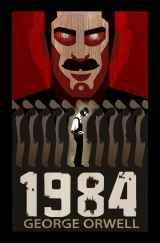
Perhaps the most famous dystopian novel of our time, Nineteen Eighty-Four was written by the English author George Orwell and published in 1949. The novel details the daily life of Winston Smith, a mild-mannered clerk who lives in a totalitarian state during the year 1984. By using the mysterious figurehead Big Brother, a simple image of a man, the governmental Party whose ideology is called IngSoc rules by causing ignorance and fear. For example one of their slogans reads, ‘War is Peace; Slavery is Freedom; Ignorance is Strength’. Winston, like Katniss, hardly knows what is true, even simple things like the date. Citizens are encouraged to routinely forget what they understand as real and adapt to a new truth; the reader learns about this with Winston’s job as a member of the Outer Party, which includes erasing pieces of history. The principal of ‘doublethink’, the ability to think of two contradictory ideas as true simultaneously, means that citizens are expected to believe whatever Big Brother wants them to. Disagreeing with the Party causes terrible consequences: as well as actions to the contrary, citizens are punished for ‘thoughtcrime’, which deems independent thinking as illegal. ‘Telescreens’, televisions that are constantly switched on, watch people and attempt to weed out thoughtcrime – The Hunger Games similarly uses media as a control. Winston, who experiences dissenting thoughts, desperately attempts to break out from this totalitarian state.
The legacy of Orwell’s novel is long-reaching and fascinating: many words from his sinister jargon language ‘Newspeak’ have been absorbed into the English language, for example ‘doublespeak’, ‘thoughtcrime’ and ‘unperson’ (a person who has been erased from existence). The novel has had many TV and film adaptations – notably one film that was released in the year 1984, featuring John Hurt as Winston – and has inspired musicians such as David Bowie, Radiohead, Rage Against the Machine, Nine Inch Nails and Muse. The recent film V for Vendetta (2005) includes similar themes and the TV shows Room 101, a comedy programme featuring celebrities arguing for what should be banned from real life and put into the fictional room, and Big Brother, a reality show filming people living in a house together, have been directly influenced by the novel. Still shocking and provocative, and alarmingly relevant to a society with increased levels of surveillance and technological advancement, Nineteen Eighty-Four is a must read.
5. Brave New World
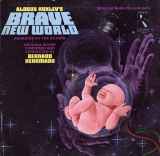
Written by Aldous Huxley and published in 1931, Brave New World is an interesting predecessor to Nineteen Eighty-Four. Orwell sent Huxley a copy of his dystopian novel and in a replying letter Huxley shares his opinion that ‘I feel that the nightmare of Nineteen Eighty-Four is destined to modulate into the nightmare of a world having more resemblance to that which I imagined in Brave New World.’ Huxley’s dystopian vision centres on genetic engineering and psychological conditioning. Brave New World’s society is organized into five castes: Alphas, Betas, Deltas, Gammas and Epsilons. Alphas are the intellectual and physical elite, whereas the lowly Epsilons are artificially made to be mentally deficient and only strong enough to perform jobs such as street sweeping, so that they don’t attempt to rise above their station. Natural sexual reproduction has been done away with – it’s even seen as disgusting, though sex itself is a fun, social activity – and instead everybody is developed in vitro and exposed to conditions that cause desired characteristics. Psychological conditioning also acts as a governmental control: for example the reader sees how young children are made to fear beautiful things like art.
The novel follows multiple characters, including Bernard Marx, an Alpha who is ridiculed for his short stature and social awkwardness. Lenina Crowne is a beautiful female beta who tries to subdue her emotions with soma – a synthetic drug that causes happiness with no side effects. John the Savage is the child of a Beta called Linda who gave birth to him naturally; because natural childbirth is illegal she was shunned from society and lived instead on the Reservation. John is a moral, though naïve, man who quickly becomes dissatisfied with a life of meaninglessness in the city, or the ‘Brave New World’. These characters all struggle with the doctrine of the city, which includes worshipping industrialist Henry Ford as a deity and heartily consuming without moral obligation, but at points they find themselves torn between rejecting the city or sinking into its easy, soma-riddled way of living. The reader is left with the same issue: is moral reasoning and the pain associated worth it when one can live in meaningless bliss?
4. The Handmaid’s Tale
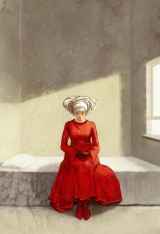
Canadian author Margaret Atwood’s sixth novel, published in 1985, explores a dystopian future where women, more specifically, become completely powerless in Gilead, formerly the United States of America, a country ruled by a government with an extremely fundamental Christian ideology. The novel focuses on the experiences and memories of a young woman called Offred who is a handmaid, in other words a woman who is a concubine to a powerful male. Women have lost all autonomy: their original names have been replaced, they are blamed for widespread infertility problems, they are banned from reading and they are considered intellectually inferior.
Both genders are subject to hierarchy, with male Commanders of the Faithful ruling at the top. Commanders are permitted to have a Wife, Daughters, servants called Marthas and a Handmaid. Offred is trapped in this hierarchal society, forced to have sex with her Commander whilst laying on top of his resentful Wife Serena Joy, and spends most of her time languishing in her room, remembering her real husband and daughter, or going shopping with another handmaid called Ofglen. When she hears about a secret insurrectionist group, Offred is plunged into a tempting danger as she fantasises about gaining her freedom. This novel is sometimes harrowing, but also captivating as a feminist perspective on dystopia, set in a world where women, as well as men, lose the freedom they have gained over centuries in most of the world as we know it.
3. Noughts and Crosses

Malorie Blackman, currently British Children’s Laureate, uses a dystopian setting in her Noughts and Crosses series to explore how racism can infiltrate society. The books are aimed at young adults – and were this reviewer’s first notable experience with dystopian literature – however there is something here for anybody interested in ideas with complex social consequences. The first book follows Persephone ‘Sephy’ Hadley, a dark-skinned Cross, and Callum McGregor, a pale-skinned Nought, who grew up together because Callum’s mother Meggie was employed by the Hadley family. Crosses are seen as superior and Noughts as inferior – Noughts are no longer slaves but the two skin colours are segregated. When Meggie is fired Callum and Sephy stay friends in secret, but find it difficult to remain so in a world striving to keep Crosses and Noughts apart; when Callum becomes one of the first white students at Sephy’s highschool even more tensions arise, though the two do become closer, particularly when Callum’s family experiences hardships.
As the plot unfolds, into a novella and then four subsequent novels, the lives of Sephy, Callum and their families are endangered by the terrorist Nought group Liberation Militia, the Cross-biased government and society’s perceptions about skin colour. There are obvious parallels between racism in the books and in real life, particularly reflecting viewpoints in 1960s America when many events, including the first black students entering certain schools, took place. Even little details, such as dark skin-colour plasters and ‘Crossmas’ instead of Christmas, make the reader think about racism in our world. Blackman’s changes to history, including the idea that the supercontinent Pangaea, calculated to exist 200-300 million years ago, never separated so Africa is put at a geographical advantage – shows how arbitrary it was that white Europeans became advanced in some ways and decided that they were a superior people, and therefore how damaging and distressing racism is in all parts of life.
2. The Day of the Triffids
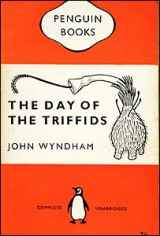
Not all dystopian novels are about humans ruining their own world – sometimes extra-terrestrials like to get in on the action too. There are many novels about alien species putting the human race in peril, a different famous example being War of the Worlds by H.G. Wells, but The Day of the Triffids, written by John Wyndham and published in 1951, really stands out as a brilliant example of this dystopian subgenre. Disaster strikes the world as those who watch a dazzling green meteor shower all become completely blind… and easy prey to the giant, violent plants called triffids that begin to take over as a superior race of predators. A pre-meteor accident involving triffid venom, that causes his head to be bandaged, turns out to be lucky for protagonist Bill Mason, one of the few people who can still see. Mason steps out of a mostly abandoned hospital into a London rapidly changed, normal society having collapsed due to the collective blindness and growing threat of large, walking plants with venomous stingers. He, alongside a sighted woman he finds called Josella, must navigate his way through the dangerous city, avoiding triffids and the desperate blind inhabitants alike.
The plot is fairly simple in nature, but Wyndham’s style of writing builds up the triffids from vaguely laughable giant plants into terrifying, monstrous entities capable of intelligence and seemingly telepathic communication – they have distinct advantages over the suffering human population. The Day of the Triffids has been popular over the years, inspiring radio dramas, films, TV series (including a hilarious 1981 BBC production), a Marvel comic and even a sequel novel, set 25 years after the original, called Night of the Triffids. The novel perhaps doesn’t ask as many questions about the state of human society as say Brave New World or The Handmaid’s Tale, but the human reactions to the triffids and one another in the aftermath of an apocalyptic event certainly make for an interesting read.
1. A Clockwork Orange
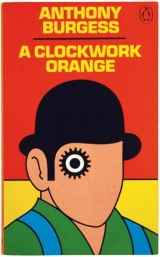
This stylish, chilling, kick-in-the-face of a novel, written by Anthony Burgess and published in 1962, follows an alternate state of society where youth culture, crime and violence rule over a struggling justice system. The anti-hero narrator, Alex, is a teenager who likes nothing better than stealing, raping and murdering with his gang of mates or ‘droogs.’ One of the most enjoyable, and occasionally confusing, parts of the novel is the anti-language used, called ‘Nadsat’, which takes elements of Russian, cockney rhyming slang, baby talk, English vernacular and Biblical speech and mixes them together into a bizarre reading experience. ‘Nadsat’ reflects a spoken vernacular specifically to do with a sub-culture of teenagers; at first the words, such as ‘chelloveck’ meaning fellow, ‘horrorshow’ meaning cool and ‘viddy’ meaning to look, appear strange but soon the reader begins to understand the anti-language, at least syntactically, as they become immersed into Alex’s perspective.
The novel focuses on Alex’s horrendous criminal exploits – he rapes a disabled man’s wife and beats an old woman to death with a ceramic phallus, and also shows an inherent lack of remorse. Once imprisoned, he is selected to be conditioned so that his violent tendencies will stop. Scientists inject him with a substance that makes him feel nauseous and then force him to watch violent videos, forging the connection between violence and nausea in an example of classical conditioning, similar to the practices on children in Brave New World. Alex re-enters the world rehabilitated, but completely unable to protect himself from vengeful enemies and ex-droogs. The novel prompts questions about society, and the criminal justice system in particular: are those who go to prison in need of punishment, or treatment? Is conditioning an immoral process, or is taking away aspects of freewill always countable as immoral if we are already helplessly conditioned genetically and environmentally? As with many dystopian novels, despite being set in a different possible world, A Clockwork Orange appeals to readers because it covers issues that are arising, or may arise, in the real world.
This article has only carved a small dent into the extensive genre of dystopia, but hopefully these recommended novels will help those wondering where to start with dystopia, or as a nostalgia trip for those who have already turned the pages and discovered the intriguing worlds within.
What do you think? Leave a comment.











I’m a huge fan of dystopian fiction, I’m even writing my undergraduate dissertation on Atwood next year! As I’ve read all the books mentioned, except “The Day of the Triffids”, I really enjoyed reading reminiscing over these classics while reading your article. Really interesting article 🙂
Thanks 😀 I had a good old reminisce whilst writing this – and I really need to get round to reading more by Atwood!
While I’ve only read “the handmaid’s tale” and “a clockwork orange” I was really interested to read about the others and I definitely want to read some. When I saw the title I was hoping it’s have ” the handmaid’s tale” It’s one of my favourite novels and is has so many depths to it. Really good article:)
Cheers 😀 I definitely recommend all these titles! My info search for this has set me onto so many things I want to read, sometimes it’s a pity that reading is such a big part of my course, no free reading time!
I had the same problem=no reading time. When I got my kindle, I found that it has a “text to speech” feature where you can set it to read the story to you. I use it to “read” when I am working, cleaning, driving. It’s a great way to catch up on reading.
1984 is not just a book, it is a fantastic love tale, it is a compendium of human traits and society, it is a grim prophesy, a clever philosophical discussion, and so much more. Should be read as much as the bible. Lovely article, each of these books are a masterpiece in their own right.
Thanks! One of the most remarkable things for me is how ridiculously frustrated I felt after reading 1984, I don’t think a novel’s content has ever riled me up as much before or since, such immersing prose!
A very well written piece! It’s also nice to see someone acknowledge the 1981 BBC production of ‘The Day of The Triffids.’ What japes!
I’m Alan Crayon.
Cheers Alan 😀 I haven’t read any adaptations of Day of The Triffids yet, but I’ve heard from a friend that the 1981 BBC one is hilarious!
Brilliant choices! It’s great to see Noughts and Crosses up there too. Not many people seem to have heard of the series these days.
Cheers Amelia 😀 Noughts and Crosses was one of the best series of my childhood!
Thank you! Noughts and Crosses was one of my favourite series some years back, I definitely read the first trilogy more than once 🙂
oh dear… it appears my internet is lagging!
Stellar choices! I love all these books, and they are definitely representative of the finest dystopian fiction. Have you read Margaret Atwood’s other dystopian work? The third in the her post-apocalyptic Oryx & Crake series is coming out in August – set to be an epic!
Cheers Hannah, I haven’t gotten around to reading Oryx & Crake but have heard very good things – it’s definitely in the weird and wonderful ‘to read’ list I have compiled in my head!
Awesome list! I’m a little sad to see that Fahrenheit 451 is missing but, otherwise, this is a well rounded list that certainly acts as a good intro for those new to the genre. I’ll definitely be sure to check out The Day of the Triffids at some point. I’ve never heard of it but it sounds like a really interesting read.
Hi Jessica – I think Farenheit 451 would be on the list, but alas I have not read it yet! It’s definitely on my to read list 🙂
I loved this article! Well-written and very interesting. I love dystopian fiction but have only had the chance to read Handmaid’s Tale on this list. I’ve been meaning to read 1984 (I’m so ashamed that I haven’t yet!) so perhaps I will get to that very soon.
Thank you! I wouldn’t be ashamed about not having read 1984, there are so, so many books I have not read yet – I have a very long queue of them waiting!
Good article Camille (nice to see another Sheffield-dweller on here)
I find Huxley’s ideas about his vision being more prevalent than Orwell’s pretty interesting. I’m torn as to whether the world we live in today is more BNW or 1984, but I think in the end we’ve definitely reached a very BNW point at the moment, with the use of recreational drugs, alcohol, the all-encompassing desire to reach physical and emotional perfection, etc (just look in a magazine like ‘Heat’, for example). I think the dystopian genre is more relevant than ever in 2013. Enjoyed the article.
Hooray for Sheffield! I found the Huxley-Orwell letter so interesting I just had to use it in the article – and I agree, I reckon that BNW is perhaps more relevant to how we live today, though 1984 does have its place.
Really enjoyed this article. I’m not sure if this is just a list with no attention paid to the order – since for me Orwell’s 1984 would be number one with A Clockwork Orange in behind it.
I must admit I haven’t read Atwood’s work – since my English modules at university I have tried to avoid Feminism since it swallowed a large proportion of my time. But I must admit it does seem somewhat intriguing.
I loved Huxley’s BNW also which just means you have selected three of my favourite novels, not only for this topic, but throughout literature. I must congratulate you on that – I’m difficult to please!
Thanks for the tip on Noughts and Crosses – that seems really interested.
I’m looking forward to more of your articles.
Interesting*
Hi Robbie,
The list is in no way ordered – just a formatting element (might ask to get it changed…)
Yes, I find that certain parts of study seem to sneak up on you in a degree, particularly depending on professors’ interests. After my final year I will have studied Angela Carter in three different modules!
I’m glad that you enjoyed the article – more coming soon 😀
Great article!
The Handmaid’s Tale is one of my favorite novels of all time so it’s great to see it up there. I hadn’t heard of Noughts and Crosses before, but it sounds fascinating and I will definitely be giving it a go in the near future!
Thanks Lisa! I’m glad you like the sound of Noughts and Crosses, I haven’t read the series for a couple of years now but I reckon it’s definitely worth a read.
Hi Camille, great article. I too am a massive fan of dystopian fiction. I think the main reason they are so attractive as a genre is because they offer up a portrayal of humanity’s need to fight oppression, on both a small and large scale. From H.G. Wells’ ‘The Time Machine’ onwards I think the tendency to portray the protagonist as someone either trying to protect or escape from an overwhelming force of oppression or violence is due to the fear of it. I would recommend to you Yevgeny Zamayatin’s novella ‘We’ as it acts as a precursor to both ‘BNW’ and ‘1984’, seeing the oppression and state violence available to humanity within totalitarian states. The idea of a control society is a fascinating one too, and I think one that is incredibly relevant to to our society today, especially in the wake of the recent revelations of global spying. There are many science fiction novels dealing with this fear of surveillance but the books you listed all have some aspect of this in their plots.
Once again a great article and definitely something worth thinking about in our globalised society.
Peter Carr
Hi Peter, thank you for your comment! ‘We’ sounds brilliant, thanks for the recommendation.
Good list. I would kinda hope that people read most of these BEFORE The Hunger Games, though, given that most of the books actually created dystopian fiction.
Cheers Lauren 😀 yes, I think that reading these novels beforehand boosted my enjoyment of The Hunger Games, however everybody’s got to start somewhere.
Does the novel create the genre or the genre create the novel, or is the connection between them different entirely… now there’s a fun debate!
Was really happy to see A Clockwork Orange on here; a masterpiece of literature AND film.
The Sleeper Awakes (H.G Wells) is another fantastic dystopian novel for those who are interested in the theme.
I thoroughly enjoyed The Handmaid’s Tale and 1984, I think I’m going to try A Clockwork Orange next. Thank you!
I do wonder about how Handmaid’s Tale would play out on screen. It would be an interesting exercise.
I am flying through books right now and need all the recommendations I can get! Dystopian fiction like this is right up my alley. Thanks for your help!
Camille, all of your suggestions for dystopian novels are very good. I have read four of the books you suggested and can see the underlining theme running between all of them, especially in the similarities between Orwell’s 1984 and Huxley’s Brave New World. I have always been a huge dystopian novel fan far before it became such a popularized genre (in the media).
One book that I found particularly engaging was Lowry’s The Giver. This was the first dystopian novel I read as a child.
Good choices, and great taste in books too!
I was just going to suggest The Giver as a powerful addition to this list.
And don’t forget Fahrenheit 451.
All these novels represent a response to the climate of the time. 1984 came out of the horrors of Nazi Germany and Stalinist Russia. Fahrenheit 451 was a response to the anti-intellectualism of the McCarthy era. The Giver, which came out in the 1990’s suggests that if we actually did have a world in which everyone was equal and we terminated all bad behavior, put all children in uniforms, made sure life was orderly, controlled for over-population, dealt with all unhappiness and avoided all unpleasantness – there’s a cost. Is it worth it?
The Giver is a book written at a fourth grade reading level but brings new depth each time you read it. So even if you had to read it in school, read it again. It will blow you away.
Excellent list. I recently downloaded Brave New World as an audiobook and your article has inspired me to move it to the top of my playlist. All of these books are definitely worth reading in my opinion–more so than most dystopian YA books currently on shelves. However, some of those YA books are not a bad read either. The Lunar Chronicles series, Under the Never Sky series, even the Delirum series are all personal favorites of mine.
I saw your site and thought I could suggest a dystopian fiction ebook I just finished co-authoring. It’s called The OBSTACLE, and is available on Amazon Kindle and Kobo.com. Paperback will follow soon. Be sure to read the sample (longer excerpt is on Amazon – 17,000+ words).
I hope you enjoy it! Thanks!
– Chris
http://www.TheObstacleBook.com
http://www.amazon.com/OBSTACLE-Frank-Casso-ebook/dp/B00IMUAJR4/ref=la_B00IO65E1M_1_1?s=books&ie=UTF8&qid=1393955885&sr=1-1
http://store.kobobooks.com/en-US/ebook/the-obstacle-1
Camille, this is a phenomenal list. It is well thought out and so deliberate in its choices. It fascinates me that the idea of the dystopian lends itself so well to character development, while make us, the reader, question the world currently spread before us. An additional novel I strongly recommend would be ‘Anthem’, by Ayn Rand.
Your piece struck such a chord with me, as I am writing an article entitled ‘Metaphors of an Impossible Dystopian Present’, which explores Golding’s ‘The Lord of the Flies’ and Orwell’s ‘Animal Farm’ and their implications on currently evolving societal narrative. I would value your feed back once its published and look forward to reading more of your work.
Job well done.
The only books from this list that I’ve read are 1984 and The Handmaid’s Tale; both are great works of literature. I actually just finished The Handmaid’s Tale and was thoroughly frustrated with the ending, but as a whole it was an excellent read. It definitely belongs on this list.
I remember reading 1984 when I was in high school. Great list!
I love dystopian fiction. Glad I got this handy shortlist to add to my very long one.
Technically pre-distopian, but the watchmen stands out. wonderful graphic novelnovel.
Hitchikers guide to the galaxy is technically distopian.
excellent article.
I love this. I’m fascinated with our obsession with dystopian novels. I wonder why we always love reading them!
Dystopian fiction is some of my favorite reading. There’s a lot of great books listed here, although in my opinion, 1984 tops any on dystopian fiction list. Orwell is a fantastic writer, both with content and with style. He’s definitely one of my all time favorites.
I’m taking a Literary Utopias class this semester so I have utopias and dystopias on the brain. It’s funny how some books featuring so-called “utopias” seem to still have elements of the dystopia. Another great read as far as dystopian fiction is V for Vendetta, although a spectacular novel that explores how easy it is for a society to become either a utopia or a dystopia is Marge Piercy’s Woman at the Edge of Time.
I must be such an indie turd. I clicked this article expecting to say to myself, “Ah, yes, these fine books I have already read indeed fill this list. Good to see I am so learn’d.” Nope, I’m a ponce. I’ve never heard of half of these entries. Very happy to have my reading list expanded. thank you.
Camille, thanks for a fascinating list! I have to admit I’ve not heard of Noughts and Crosses, but I’ll be sure to track it down. 1984 certainly belongs on this list; one of the things that really surprised by when I read it was how human the story is. There is a very effective love story integrated within the more famous facets of the book.
Again, fantastic list!
We watched the film version of “The Handmaid’s Tale” in a summer course on Sex and Gender.
I must add all of these to my reading list, especially because of how they explore inherent issues in human nature through the most creative “what-if” scenarios. Your descriptions restore my faith in the dystopian genre (I was originally dissuaded by the amount of similar dystopian young adult novels that all follow the same basic storyline.)
I would add Station Eleven by Emily St. John Mandel to the list.
You will never look at an airport the same way again.
Thanks! Now I know what I need to fill the gap in my reading life!
Clockwork Orange definitely expresses the spirit of its age.